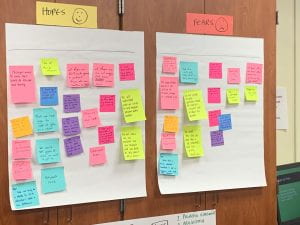 Coordinator of Assessment, Data, and Accountability Jeanne Corcoran and educational consultant Gene Thompson-Grove facilitated a Data Inquiry Team Workshop for teams from each of the schools this week. Teams considered how and why schools collect different types of data. They examined and contrasted the different kinds of data used in schools, explored how data can be interpreted and used, and constructed a problem statement and began to craft an inquiry. Each team member discussed their hopes and fears in terms of what would make the experience a success.
Coordinator of Assessment, Data, and Accountability Jeanne Corcoran and educational consultant Gene Thompson-Grove facilitated a Data Inquiry Team Workshop for teams from each of the schools this week. Teams considered how and why schools collect different types of data. They examined and contrasted the different kinds of data used in schools, explored how data can be interpreted and used, and constructed a problem statement and began to craft an inquiry. Each team member discussed their hopes and fears in terms of what would make the experience a success.
The following textbook definitions of Data Inquiry Teams were explored:
- Data inquiry teams are teams of educators that meet regularly to analyze student data, to reflect on student progress, and to create action plans that will improve instructional effectiveness.
- Data inquiry teams focus exclusively on analyzing data for the students they teach and developing plans for responding to the needs and strengths of individual students, groups of students, and particular areas of curriculum.
We engaged in a Chalk Talk:
- When you hear the word data – what do you think of?
- What counts as data?
- What types of data do you access regularly or use in your work?
This activity helped the teams identify the types of data that are most meaningful and most likely to help improve the teaching and learning process. We then did a Data Sort  Exercise Activity in partners and sorted cards with different types of data into four categories: Process Data, Outcome Data, Demographic Data, and Perception Data.
Exercise Activity in partners and sorted cards with different types of data into four categories: Process Data, Outcome Data, Demographic Data, and Perception Data.
Each team formulated a Problem of Practice Statement (as a statement, student learning goal, or inquiry question). that would be worthy of exploration.
Other questions explored were:
- What is one thing you know is true about your school that others may not know? How do you know that?
- What is one thing people think is true about your school? Why might people think that?
- What is one thing you would like to understand better about your school and/or your classroom practice?
We created Data Team agreements, established norms, goals, and ways to measure our success.
